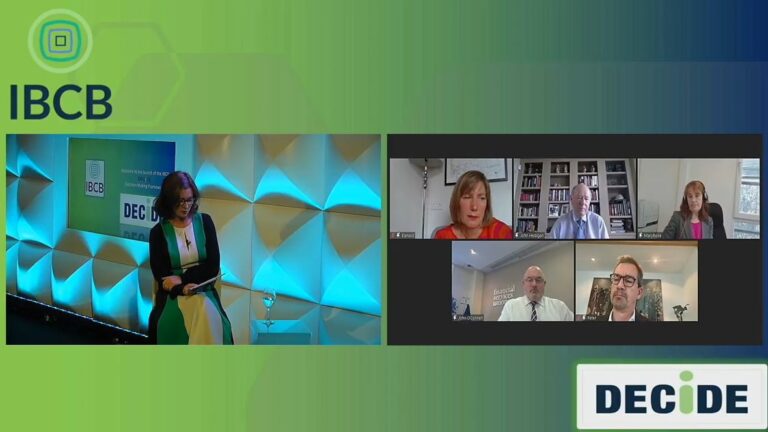
IBCB Panel Discussion
IBCB Launch of DECIDE Ethical Decision Making Framework Panel Discussion with representatives from KBC, FSU, FSPO and IBCB Board Members, Chaired by Prof. Blanaid Clarke, TCD.
Ethical decision-making means different things to different
people. Generally, it relates to decisions which:
The purpose of the DECiDE framework is to assist with this decision-making process by prompting you to consider various elements which will enable you as the decision-maker to be able to stand over the decision you took at a point in time, even if it transpires in due course that the decision was not optimum.

understand the facts
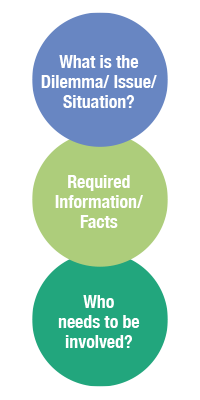

take the time to consider the alternatives, different perspectives, the implications for the range of stakeholders involved and the likely impacts and consequences
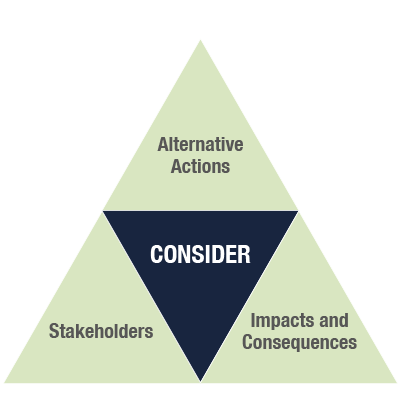
Consider the question ‘what should I do?’ versus ‘what can I do?’

ask yourself the questions: How do I impact the decision? What are my personal biases or influencers likely to impact my decision? These are often unconscious or below the line factors that we must make a conscious effort to consider
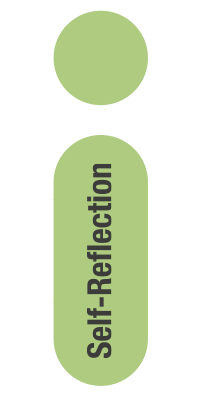
What are the factors that influence your decisions? Consider your own personal character. What do you know about yourself that might impact on your decision-making process?
Hierarchy of loyalties – Where do your loyalties sit and in what order e.g.
Are you more inclined to show leniency, compassion, and forgiveness (mercy) or to want fairness and for people to get what they deserve (justice)?
Having considered these questions and understood the biases and influences at play, you will be better placed to make a balanced decision.
‘Bounded Rationality’ suggests our decision-making is limited by the information to hand, the cognitive limitations of our minds, and the finite amount of time we have to make a decision. While we often use ‘heuristics’ (mental rules of thumb) to assist us in making decisions, they can lead to biases. Some of the most relevant behavioural biases are:
We interpret evidence as supporting our prior beliefs/decisions to a greater extent than is warranted. When we believe a conclusion is true, we seek out and believe arguments that appear to support it and reject evidence that undermines it.
1 Source: Professor Blanaid Clarke, McCann FitzGerald Chair of Corporate Law, School of Law, Trinity College Dublin and Deputy Chair of the IBCB.
Present bias refers to the tendency to give stronger weight to results that are more immediate as opposed to longer term when considering options.
‘Hot-states’ are caused by physical factors such as hunger or tiredness or emotional factors such as time pressure, stress, anger, or grief and can result in specific goals being overshadowed by short-term influences. For example, assume you have set yourself a long-term goal of maintaining a healthy weight and eating nutritiously. However, when you walk into the supermarket you haven’t eaten in five hours. When you see biscuits, the driving force of your hunger leads you to seemingly act irrationally by behaving in contradiction to your long-term goals. You are in a ‘hot-state’, so you buy and eat the biscuits.
All that has happened is that your emotions, which dictate your preferences, have shifted and intensified on a particular object. In the moment, you have a greater emotional reaction that motivates you to alleviate your hunger and give in to your gut, quite literally, rather than abide by your long-term values of health and nutrition. Your values have not necessarily changed. Instead, the quantity and intensity of the emotion resulting from a particular stimuli (hunger) has increased, resulting in you making a decision based on a short-term need rather than your long-term goal.


Consider discussing with your team if any elements of the decision should be documented. As part of this process consider also how you would document where there are exceptions to the use of the framework.
Don’t underestimate the importance of communications, in particular if the decision is an exception to the prevailing rules/guidance/values. Focus on explaining why an exception is appropriate and whether a change to the prevailing rules/guidance/values is required as a result. Consider the question: Is the rule wrong, or is it just inconvenient?


Following the decision, take the time to reflect on it and identify any lessons learned.
Possible resources: Intranet site, Support/Helplines, Line Manager, Mentors, Coaches, In-House Counsel, Compliance Officer.
Speaking Up: An effective ethical decision-making framework must be supported by an effective and transparent approach to Speaking Up. All staff must feel encouraged, supported, and protected to report instances where they consider behaviour and/or decisions are contrary to stated values and ethics. Staff must feel they have ‘psychological safety’ to speak up and report poor behaviour and decisions.
Prompted by this feedback the IBCB decided to develop a practical decision-making framework aimed at staff at all levels in banks, from the top down. To do this, the IBCB worked with staff within our member banks to create DECiDE. Founded on established academics – with input from IBCB Deputy Chair Professor Blanaid Clarke, the IOB, the Financial Services and Pensions Ombudsman (FSPO) and journalists via a series of ‘co-create’ sessions, the purpose of DECiDE is to act as a practical guide and tool for bank staff, regardless of level, when making difficult decisions. The framework prompts staff to consider a range of issues such as the impact of Group dynamics, personal bias, the importance of diversity & inclusion, the need to consider the potential risks associated with short-termism vs more long-term and sustainability considerations etc.
The final Framework was launched by the IBCB at a virtual event on 29th September 2020 and included an opening address from the IBCB Patron, Dr. Martin McAleese, an interactive session with Prof. Frank Flynn, the Paul E. Holden Professor of Organisational Behaviour at the Stanford Graduate School of Business, California and a panel discussion led by Prof. Blanaid Clarke. The launch event was attended by member bank staff, IBCB Board members; and a small number of attendees from external organisations who participated in the co-create sessions e.g., the Financial Service and Pensions Ombudsman and IOB.
The IBCB’s 2021 éist Staff Culture Survey shows that DECiDE has made a positive impact, where staff are aware of and have used the framework.
In 2022 the IBCB developed some further resources and tools to support bank staff in the context of ethical decision-making. The DECiDE framework has also been brought to life, you can explore DECiDE in an interactive way here.
We have also developed a series of short videos and an interactive site to prompt users to challenge their own thinking and consider topics such as Present Bias, the Mirror Test and contemplate a hypothetical scenario. Each of our member banks also have their own internal decision-making frameworks and these assets have been designed to compliment those frameworks further.
The IBCB will continue to work with our member Banks to further enhance and support the use of DECiDE and other internal decision-making supports.

This event explored the ethical challenges posed by the increasing use of AI in the banking sector, via the lens of trust and reputational risk, with a view to developing steps banks can take to mitigate against these risks and protect, and potentially enhance trust. We were joined at the event by leading international experts Prof. Hse-Yu (Iris) Chiu from University College London and Prof. Katja Langenbucher from the Goethe University of Frankfurt..

IBCB Launch of DECIDE Ethical Decision Making Framework Panel Discussion with representatives from KBC, FSU, FSPO and IBCB Board Members, Chaired by Prof. Blanaid Clarke, TCD.
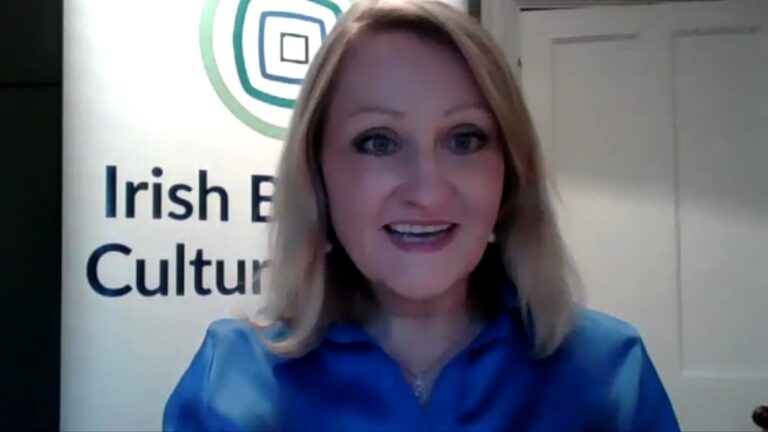
IBCB Launch of DECIDE Ethical Decision Making Framework—Intro including IBCB CEO Marion Kelly and IBCB Board Patron, Dr. Martin McAleese.
This website uses cookies so that we can provide you with the best user experience possible. Cookie information is stored in your browser and performs functions such as recognising you when you return to our website and helping our team to understand which sections of the website you find most interesting and useful.
Strictly Necessary Cookie should be enabled at all times so that we can save your preferences for cookie settings.
If you disable this cookie, we will not be able to save your preferences. This means that every time you visit this website you will need to enable or disable cookies again.
This website uses Google Analytics to collect anonymous information such as the number of visitors to the site, and the most popular pages.
Keeping this cookie enabled helps us to improve our website.
Please enable Strictly Necessary Cookies first so that we can save your preferences!
More information about our Cookie Policy